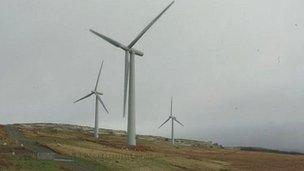Wind farm inquiry in Welshpool, Powys, attracts 300 protesters
- Published
Plans for five large wind farms across mid Wales will be looked at
Hundreds of protesters gathered in Powys to mark Britain's biggest ever public inquiry into wind farms.
A hotel in Welshpool is hosting the arguments for and against wind energy and could last for up to a year.
An alliance of 21 organisations oppose plans by six energy developers for northern Powys.
The council has earmarked £2.8m from reserves to fund the inquiry prompting concern from some members about the impact on the authority's other work.
Renewable targets
Proposed wind farms at Llanbadarn Fynydd, Llaithddu, Llanbrynmair, Carnedd Wen and repowering Llandinam, all in northern Powys, are large scale and well above the 50 megawatt jurisdiction of the Welsh government.
These plans are dealt by the UK government's Department of Energy and Climate Change (Decc).
In London, as in Cardiff, they are part of the target to achieve 15% of British energy from renewable sources by 2020. Combined, the planned output of these large wind farms could be over 500MW.
This public inquiry has been convened because Powys council, as a consultee for large wind farms over 50MW, refused to support their construction.
The campaign to try and halt wind farms - and the pylons taking the power across northern Powys into Shropshire - stems from a National Grid consultation to expand the electricity infrastructure in mid Wales.

Powys council has amassed £2.8m pounds from its reserves to fund the wind farm hearing
With potentially more than 800 turbines in the planning system, the grid has to supply either underground cables or pylons to carry overhead power lines so that the electricity is available to the rest of the UK.
Developers believe the inquiry will eventually allow them to move forward and extend Britain's renewable energy sector.
Richard Evans, of Renewable Energy Systems Ltd, feels the inquiry will lead to clarity on allowing onshore wind farms.
He said: "I'd stress that mid Wales is only a part of Wales. We've got good projects in north and south Wales as well but there's no denying there's a lot of megawatts trapped in that planning system in mid Wales.
"I think it is going to be quite important in terms of delivering Welsh government targets that we see a good amount of that capacity coming out successfully at the other end of the inquiry."
Opponents of turbines and pylons will hand over a petition to the inquiry on Tuesday which has been signed by nearly 7,480 people.
Iolo ap Dafydd tells Felicity Evans about the inquiry's significance
Up to 300 protestors have demonstrated at the at the inquiry before the planning inspector Andrew Poulter started the proceedings.
Campaigner Richard Bonfield said the alliance of protest groups considered the wind farm proposals to be "monstrous".
"They will absolutely destroy the wonderful landscape in mid Wales and everybody in these groups are opposed to the proposals," he said.
Mr Bonfield said the wind farms were being "foisted" on people in mid Wales for "meagre" returns.
"The alliance is determined to win the public inquiry and fight the wind farm plans to the bitter end," he added.
'Strategic sites'
Since the National Grid started consulting on the route for power lines two years ago, opposition to building pylons and more turbines in the valleys and on the hills in Powys has increased.
Even though it is Decc and the UK government involved with granting permission to these large wind farms, many in Montgomeryshire point an accusing finger towards the Welsh government's TAN 8 policy.
In 2005 it established three "strategic sites" to encourage wind developers to build turbines so that electricity would come from a cleaner and greener source than ageing coal power stations.
A month ago at a renewable energy conference in Cardiff the First Minister Carwyn Jones promised planning regulations could be changed to speed up some energy schemes.
Meanwhile some Powys councillors from the south of the county are concerned that the cost of the inquiry could blow a damaging hole in the local authority's finances.
Liberal Democrat group leader John Morris, from Crickhowell, said: "There is a financial risk for the council here that if we're not careful the cost could run away with us."
He said the council had hired barristers to fight the case for it but they and the council could not "defend the indefensible".
"If the barrister says we cannot fight this any more because things have changed or the finance officers says we cannot, then we have to be careful," Mr Morris added.
"This does have the potential to bankrupt the council and the risk is that if we don't fight this correctly costs could be awarded against us."
- Published14 December 2012
- Published25 September 2012
- Published2 August 2012
- Published31 July 2012
- Published9 January 2012
- Published29 June 2011
- Published22 June 2011